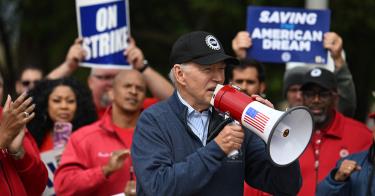President Joe Biden showed “solidarity” with striking United Auto Workers by joining it Tuesday on the picket line near Detroit—one day before former President Donald Trump is to deliver remarks to an audience of current and former union members at an auto parts manufacturer, also in Michigan.
The UAW is demanding a 35% hike in pay and benefits over four years, as well as automatic cost-of-living adjustments, just like in the 1970s, along with a four-day workweek.
The inflationary 1970s are calling Biden, and they want their benefits back—with a post-COVID-19 four-day twist.
According to news reports, Biden told workers, “You should be doing incredibly well.” But he has singlehandedly, through the power of his executive branch, caused them to face job losses and higher inflation.
By changing his policies, Biden could address some of the fundamental reasons for their strike; namely, job loss because of mandatory vehicle electrification and higher inflation resulting from his war on fossil fuels, resulting in higher energy costs.
Both were imposed by the executive branch without support from even the Democratic Congress in place during Biden’s first two years in office.
Proposed regulations on automobile emissions from the Environmental Protection Agency and the U.S. Department of Transportation would require electric vehicles to make up 60% of new car sales by 2030 and 66% by 2032, compared to fewer than 6% in 2022—all for practically no environmental benefit.
That will adversely affect new-car purchasers, who will no longer have the choice of buying gasoline-powered vehicles, as well as those who make and support those vehicles.
Drivers who like electric vehicles, primarily upper-income households in urban areas, are in luck. But those who prefer gasoline-powered cars will see increases in their costs, both for new and used cars, and UAW employees will lose jobs.
The job loss is old news. Ford Motor Co. CEO Jim Farley said last November, “It takes 40% less labor to make an electric car.” That would be 200,000 fewer jobs in 2030 and 400,000 fewer in the long run. The UAW had time to take that information into account during pre-strike contract negotiations.
New jobs in EVs and batteries for those vehicles are being created through federal Inflation Reduction Act funding, but those jobs are in right-to-work states, where wages are lower and workers do not have to join a union as a condition of employment.
Hyundai and LG are receiving subsidies for a $4 billion battery plant in Georgia, and Ford and Envision are spending a combined $8 billion on three battery plants in Kentucky.
Chinese workers are also winners, because the Chinese Communist Party owns a substantial share of the minerals required for EV batteries, such as lithium, graphite, and cobalt. Beijing is buying mines in Africa for minerals and setting up factories in Indonesia to avoid potential bans on Chinese imports.
The move from gasoline-powered engines to electric vehicles also affects auto parts suppliers, such as Delphi, which describes itself as the “global aftermarket leader” with “quality parts and diagnostics you can depend on.”
Auto parts employees will also lose jobs because EVs have fewer parts, and electrical components are likely to come from abroad.
Auto mechanics will be affected, because EV owners can’t go to their local gas stations for service. Teslas and other EVs need to go back to the dealers for servicing.
Just 6% of new vehicles sold were EVs in 2022, because Americans prefer vehicles with some gasoline-powered engine, either regular or hybrid.
The bestselling vehicle in America is the Ford F-150 pickup truck, with other pickup trucks and SUVs not far behind. The move to 60% of sales for EVs by 2030 and 66% just two years later in 2032, with an end to gasoline-powered car sales in 2035, is due to pressure from the Biden administration.
In addition to the prospect of job losses, Americans are seeing inflation, which is driving the UAW’s wage demands of a 35% increase over four years. Energy was the largest component of August’s uptick in inflation. Biden came into office with a promise to end fossil fuels, and he’s trying to fulfill his promise, so it should be no surprise that energy costs are rising.
Biden signaled to oil companies that future investments were uncertain and unwanted. Without congressional action, he ended construction of the Keystone XL pipeline, raised lease fees and royalties on federal lands, designated large swaths of federal lands off-limits to oil exploration, and ended previously agreed-upon leases in Alaska.
In addition, the Biden administration is slowing pipeline construction, and America needs pipelines to bring more oil and natural gas from where it is produced to domestic businesses and consumers, and for overseas export.
The Federal Energy Regulatory Commission is now for the first time including potential greenhouse gases and effects on “environmental justice communities” in its pipeline-approval process.
Other federal agencies, including the Securities and Exchange Commission, the Board of Governors of the Federal Reserve, and the Office of the Comptroller of the Currency, are cutting off funding for pipelines by requiring companies to report climate effects of their investments. Banks that lend for fossil fuel projects, including pipelines, and companies that produce their components, are likely to face heightened regulatory scrutiny. (Meanwhile, Biden has begged Venezuela to sell America heavy crude, this time coming to U.S. refineries by tankers rather than pipeline.)
The green agenda is driving the UAW to strike, because banning the internal-combustion engine is equivalent to banning auto jobs.
The coalition of green environmentalists and blue-collar workers is fracturing, with green policies disproportionately affecting the blues. Biden’s visit to the picket line gives the blues the opportunity to tell their concerns to the president in person.
EV mandates and high energy prices from the president that the UAW campaigned for and helped elect are leading to shrinking worker incomes. That should be the message from the UAW to the president today.
This piece originally appeared in The Daily Signal



